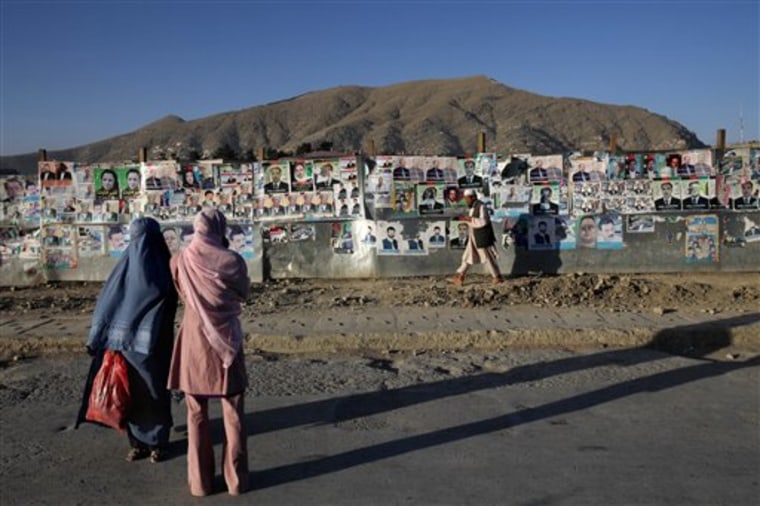Afghan journalists charged Wednesday that their government was violating the constitution by trying to censor reports of violence on election day, and they vowed to flout the order issued by an administration that appears increasingly hostile toward the media.
The Taliban have ramped up attacks ahead of Thursday's presidential vote and threatened to attack polling stations on the day itself.
Fearing that reports of violence could dampen turnout, the Foreign Ministry issued a statement Wednesday saying that news organizations should avoid "broadcasting any incidence of violence" between 6 a.m. and 5 p.m. on election day "to ensure the wide participation of the Afghan people."
Even before the ban went into effect, police beat back journalists arriving at the scene of an attack on a Kabul bank Wednesday.
The English version of the document said media "are requested" to follow the guidelines. But the version in the Afghan language Dari said broadcasting news or video from a "terrorist attack" was "forbidden."
A previous version in Dari had more strongly said that such reporting was "strictly forbidden" and called for a blackout until 8 p.m.
Journalists threatened
Meanwhile, a separate statement from the Interior Ministry said journalists should stay away from the scene of any attacks until investigators have a chance to collect evidence.
Journalists who rushed to the bank were threatened by police, who pointed loaded guns in their faces and hit others with batons and the butts of rifles, according to journalists from The Associated Press.
One officer yelled, "Your pictures help the enemy! Why are you helping them?" at an AP reporter as he shoved him back.
Over the last few days, journalists responding to attacks in the capital have reported increasingly rough treatment. On Tuesday, a police officer beat a photographer with his pistol at the site of a bomb attack on a NATO convoy, according to an AP photographer who witnessed the act.
Afghanistan's local media — the country has a host of newspapers, radio stations and television news outlets — condemned the statement as stifling freedom of the press that was supposed to have returned after the ouster of the Taliban in 2001.
"We will not obey this order. We are going to continue with our normal reporting and broadcasting of news," said Rahimullah Samander, head of the Independent Journalist Association of Afghanistan.
Order to ‘benefit national interest’
U.S. Embassy spokeswoman Fleur Cowan said the U.S. acknowledged the sovereign rights of the Afghan government but believed that free media reporting "is directly linked to the credibility of the elections."
Foreign Ministry spokesman Ahmad Zahir Faqiri said the order was made to "benefit national interest and national security."
"If anyone broadcasts or gives news about any movements or activities of terrorists, domestic media offices will be closed and foreigners will be kicked out of the country," he told AP in a phone interview.
Watchdog groups blast order
Media watchdog groups condemned the order. Reporters Without Borders said in a statement that it "not only violates media freedom but also the fundamental right of Afghan citizens to know what is going on in their country."
Robert Mahoney, deputy director of the New York-based Committee to Protect Journalists, said the move echoes attempts by security forces in Iraq to eliminate negative press in 2007 and 2008 by blocking journalists from covering attacks.
The AP said it would protest the ban as an infringement of the free flow of information.
"If authorities impose a gag on international news organizations inside Afghanistan, there is no doubt that reports of any violence will be spread by rumor and word of mouth, which may be more chilling," said John Daniszewski, the AP senior managing editor overseeing international news in New York. He also said he was troubled at early reports that journalists were being harassed and intimidated in the run-up to the vote.
"People around the world have a keen interest in election news from Afghanistan on this important day."
Samander, of the journalist association, said a presidential spokesman called him Tuesday night to tell him to inform members not to report violence on election day. He refused.
‘A violation of media law’
When there are rumors of violence, "the first thing they do is turn on their radios or TVs, or go on the Internet to read news," he said. "If the people aren't able to find information, it will be very difficult for them to participate in the election. If there is, for example, an attack on a highway going to a polling station, the people should know about it. It may be dangerous for them to use that highway."
Fahim Dashti, the editor of the English-language Kabul Weekly newspaper, called the demand "a violation of media law" and a constitution that protects freedom of speech. "If some huge attack occurs, of course we are obliged to cover it," he said.
But the appeal may embolden security forces who have already been increasingly hostile to journalists trying to cover attacks in recent days.
On Wednesday, at least one photographer's camera was broken in the scrum of police and journalists, during which police also attacked civilians. One officer used the butt of his rifle to beat a man with a crippled leg, according to an AP photographer on the scene.
Saad Mohseni, the owner of a media conglomerate that includes the country's most popular television channel and radio station, said Afghan news outlets must consider how their reporting would affect voter turnout, but "to try to enforce it through some sort of presidential decree is bizarre."
